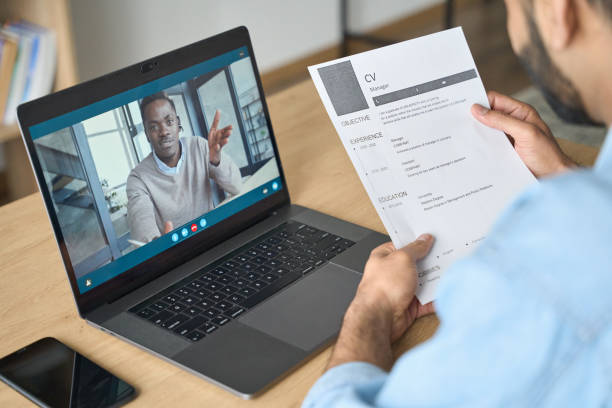Job seekers prefer video interviews as they are convenient to show up to. However, you need to make sure that you make all the necessary arrangements and preparation for conducting an online job interview. In order to reap the benefits of a video interview, you need to be well-prepared.
Here are some tips on making video interviews more seamless and effective!
Define a process and prepare thoroughly:
Just like the in-person interviews, you should have a proper and well-thought-out plan for conducting the video interviews. Even if your team is familiar with what an online interview entails, ask them to provide you with a detailed plan.
Do you want to include a presentation slide or a pre-employment assessment test? It’s better to decide on what the interview will be like to ensure you have everything sorted before time. For some jobs, you might require work samples or portfolios of the candidates, so it’s best to let the candidate know, so they can prepare ahead of time.
You also need to have a backup plan if the internet connection becomes an issue during the interview. Take your pick among the video interview platforms options available. Test run your equipment before the interview for checking the picture and sound quality and get used to the software if you haven’t used it before.
If you are using some new software, do research on identifying the common issues faced by users and prepare solutions for handling them.
Send an email with all the basic and additional details to the interviewees about the video interview. Inform the candidates beforehand about any credentials or downloads needed. Provide clear instructions on how to join the interview and mention a phone number in case of connectivity issues.
Pay attention to the smaller details:
Every single detail counts for leaving a positive image of your organisation and getting the most out of the video interviews. Choose a well-lit space with no or less noise and distractions. Dress for the video interview just like for in-person interviews.
Log on ten minutes before the interview time to check the functionality and connectivity and give a good impression by being punctual and prepared.
Make an interviewee feel that the online interview is as important as the onsite one and give a glimpse of your company’s professionalism by adhering to the processes and protocols for conducting the interview.
Keep your phone silent and don’t check it during the interview as it is likely to give a rude gesture to an interviewee, treat the candidates with respect if you want to successfully sell them a position.
Smile to ease the anxiety of the candidates and keep your body language positive throughout the interview. Tell an interviewee about the picture and sound quality or if there is anything that is distracting. Don’t judge candidates for hearing disrupting background noises, instead give them a chance to fix an issue.
Offer flexibility to the interviewees by asking them to switch to a phone call if there are persistent technical and other issues. Being accommodating toward the candidates will make them feel comfortable and will enhance your company’s reputation as an employer with good hiring practices.
One of the most helpful tips on how to conduct a video interview is to create a comfortable experience for portraying a positive image of yourself and your organisation.
Give an overview of the company and the job role:
Prepare the pointers about a position and your organisation to be shared with the candidates in the video interviews. Even though you have explained all the requirements and job responsibilities in the description, it is important to provide all the details to an interviewee along with an insight into your company’s culture.
If you have already evaluated the portfolio of a candidate, ask questions about the kind of work that grabbed your attention and share a screen for elucidating what you are expecting in a role. Talk about what it is like working at your company so that the candidates have all the requisite information about the job, benefits, and work environment.
Be consistent with asking questions:
Make a list of the questions to be asked from the candidates during the video interviews and stick with asking the same ones from all the interviewees. This will make it simpler for you to compare the responses and make a decision based on merit. You can also use a scorecard for conducting the online job interview.
Most of the interviewees tend to be more confused and nervous during the video interviews, so use the ice breaker and conversation starter questions like tell me about yourself or I will like to know something about you that is not on your CV.
Timely follow-up with the candidates:
After you are done with an online screening interview, it is important to follow up with the candidates in a timely manner. Send an email or call informing them that you are considering conducting more interviews before making the final decision and let the applicants that are not being selected know the reasons.
To combat the time and technology constraints/issues, you can consider pre-recorded interviews. Provide the candidates with the set of questions and specify the length/time duration for each response.
There are platforms that support the video files, make sure to specify the format. The recorded interviews are evaluated differently than the live ones so you need to communicate all the parameters to the interviewees.

Mastering conversational recruitment with virtual fairs
Conversational recruiting is a technique to attract, screen and engage with candidates in a real-time setting to avoid unnecessary delays, cold interactions and one-dimensional dialogues. User attention span online is dropping, and the window to build relationships...

Should my business hold virtual events?
In the current situation we as a globe are facing, businesses are searching for alternative methods to reach their audience. Virtual events have peaked the interest of many, purely for increased reach and continuing to connect and network despite the obstacles...

Key insights to holding video interviews with candidates
The government continues to stress the need of social distancing, and avoiding social gatherings where possible. However this does make it harder for those hiring to interview potential employees. This doesn’t mean that recruiting top talent in the legal industry has...



